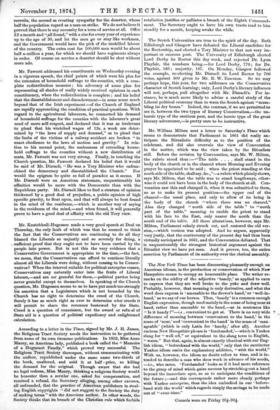Mr. Fawcett addressed his constituents on Wednesday evening in a
vigorous speech, the chief points of which were his plea for the extension of household suffrage to the counties, with a com- plete redistribution measure ; his advocacy of some plan for -representing all shades of really widely received opinions in each -constituency, when the redistribution is complete ; and his belief -that the disestablishment and disendowment—in some sense much beyond that of the Irish experiment—of the Church of England .are rapidly approaching the condition of practical questions. With regard to the agricultural labourers, he connected his demand of household suffrage for the counties with the labourer's great need of more self-respect, and declared that it was as irrelevant to plead that his wretched wages of 12s. a week are deter- mined by "the laws of supply and demand," as to plead that the limbs of the victims of a railway accident are broken "in exact obedience to the laws of motion and gravity." In rela- tion to his second point, the uselessness of extending house- hold suffrage to the counties without a new distribution of seats, Mr. Fawcett was not very strong. Finally, in touching the Church question, Mr. Fawcett declared his belief that it would be said of Mr. Disraeli, "He was a Tory Minister who enfran- chised the democracy and disestablished the Church." Nor would the epigram be quite so full of paradox as it seems. If Mr. Disraeli were an American statesman, unquestionably his affinities would be more with the Democratic than with the Republican party. Mr. Disraeli likes to find a stratum of opinion thickened by a good deal of prejudice, a public opinion of high specific gravity, to float upon, and that will always be best found in the mind of the residuum,—whieh is another way of saying in the residuum of the mind,—and when found, it will generally prove to have a good deal of affinity with the old Tory view.


































 Previous page
Previous page